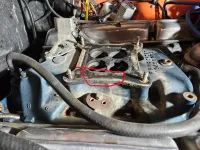Just to show what the VERY thorough and wordy Gemini reply looks like. IMO, way to much info!
Okay, let's break down your CJ7 fuel and running concerns:
Fuel Octane and Ethanol Content
*
Understanding Your Engine: The AMC 290
could have high compression, but it depends on the specific build. Stock 290s from the late 60s had compression ratios around 9.0:1, which isn't
super high but might benefit from premium fuel. However, being a 1979 CJ7, that AMC 290 is from a few years before that, and most of those 290's were rated at closer to 8.5:1 compression, meaning a lower octane is usually sufficient. Since yours is a swap, and you don't know its history, you'll have to experiment.
*
Ethanol Concerns: Ethanol is bad for older fuel systems. It can dissolve rubber components (fuel lines, seals, carb parts), attract water, and cause corrosion. Modern vehicles are designed to handle it, but vintage vehicles are not.
*
Your Options:
*
Non-Ethanol 91: This is your best starting point. Try it first. If you experience no pinging (detonation) or knocking, you're probably fine. It eliminates the ethanol problem altogether, which is a huge win for long-term reliability, especially in storage.
*
93 with Sta-Bil: This is a reasonable compromise
if you can't get non-ethanol 91. The Sta-Bil will help prevent ethanol-related issues, especially during storage.
However, it's still a band-aid. You're still exposing your fuel system to ethanol. If it's the only readily available option, use it, but be diligent with the Sta-Bil (follow the instructions
exactly).
*
112 Octane (Non-Ethanol): This is almost certainly overkill. Unless you
know you have a seriously high-compression engine that requires it (and the Edelbrock carb is jetted accordingly), it's a waste of money and could actually
hurt performance. Engines are designed to run on a certain octane. Using a much higher octane than required doesn't give you more power. It just burns slower, and you might get incomplete combustion.
*
The Best Approach:
1.
Start with Non-Ethanol 91. This is your ideal scenario.
2.
Listen for Pinging: When you drive, pay
very close attention to whether the engine pings or knocks, especially under load (going uphill, accelerating hard). Pinging sounds like rattling marbles in the engine. If you hear it, you
need higher octane.
3.
If you hear pinging: Try the 93 with Sta-Bil. If the pinging disappears, you're good to go.
4.
If you still hear pinging: Then you need to investigate why. It could be a compression issue, timing advanced too far, or other engine problems.
Only then would you consider extremely high-octane fuel, but honestly, it's more likely you have another problem.
Exhaust Smell
Old fuel is almost certainly contributing. The bad smell could also be caused by a few other issues:
- Rich Fuel Mixture: A poorly tuned carburetor (especially an Edelbrock) can cause the engine to run rich, meaning it's getting too much fuel. This leads to unburned hydrocarbons in the exhaust, which smell terrible.
- Catalytic Converter (or Lack Thereof): If your CJ7 originally had a catalytic converter, it might be missing or faulty. Catalytic converters clean up the exhaust.
- Exhaust Leaks: Even small leaks can cause exhaust fumes to enter the cabin.
Hard Cold Start
Edelbrock carburetors can be tricky to tune. Here are some common issues and solutions:
- Choke Adjustment: The choke is crucial for cold starts. Make sure it's closing properly when the engine is cold and opening fully as the engine warms up.
- Accelerator Pump: This mechanism shoots a squirt of fuel into the intake when you press the gas pedal, aiding starting. Make sure it's working correctly.
- Idle Mixture Screws: These control the air/fuel mixture at idle. They need to be adjusted properly for smooth running.
- Vacuum Leaks: A vacuum leak can lean out the mixture, making the engine hard to start. Check all vacuum lines and fittings.
Overheating
230°F is definitely too high for cruising around town.
*
Cooling System Inspection:
*
Radiator: Is it clean and free of debris? Is it the correct size for the engine? (An undersized radiator is a common problem). Consider the core count in the radiator. The more cores in the radiator, the more coolant volume, and the more it will reject heat.
*
Thermostat: Is it working properly? (Sometimes new thermostats are faulty). What temp thermostat is in it?
*
Water Pump: Is it flowing coolant properly?
*
Coolant Hoses: Are they in good condition?
*
Fan/Fan Clutch: Is the fan providing adequate airflow? Is the fan clutch engaging properly when the engine is hot?
- Timing: If the timing is off, it can cause the engine to run hot.
- Lean Fuel Mixture: A lean mixture also causes overheating.
- Airflow: Make sure there is nothing obstructing airflow to the radiator.
In Summary
1.
Fuel: Start with non-ethanol 91. Monitor for pinging.
2.
Exhaust Smell: Fresh fuel is a good start. If the smell persists, investigate the carburetor, catalytic converter, and exhaust system.
3.
Cold Start: Check the choke, accelerator pump, idle mixture screws, and vacuum lines.
4.
Overheating: Inspect the entire cooling system.
Your CJ7 is a project, but with a little patience and diagnosis, you can get it running smoothly and reliably!




